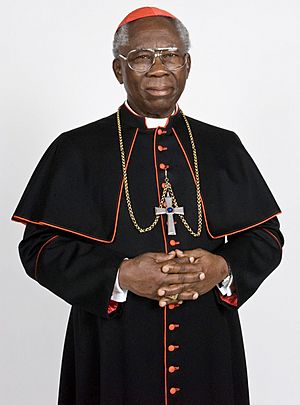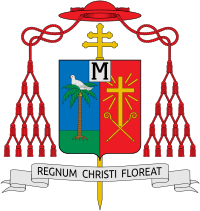Francis Arinze facts for kids
Quick facts for kids His Eminence Francis Arinze |
|
|---|---|
| Prefect Emeritus of the Congregation for Divine Worship and the Discipline of the Sacraments | |
 |
|
| See | Velletri-Segni |
| Appointed | 1 October 2002 |
| Reign ended | 9 December 2008 |
| Predecessor | Jorge Arturo Augustin Medina Estévez |
| Successor | Antonio Cañizares Llovera |
| Other posts | Cardinal-Bishop of Velletri-Segni |
| Orders | |
| Ordination | 23 November 1958 |
| Consecration | 29 August 1965 by Charles Heerey |
| Created Cardinal | 25 May 1985 |
| Rank |
|
| Personal details | |
| Born | 1 November 1932 Onitsha, Colony of Nigeria, British Empire |
| Nationality | Nigerian |
| Denomination | Roman Catholic |
| Previous post |
|
| Motto |
|
| Coat of arms |  |
| Styles of Francis Arinze |
|
|---|---|
 |
|
| Reference style |
|
| Spoken style | Your Eminence |
| Informal style | Cardinal |
Francis Arinze (born November 1, 1932) is a Nigerian Catholic leader. He served as a top official in the Vatican, leading important departments. From 1984 to 2002, he was in charge of the office for talking with people of other religions. Then, from 2002 to 2008, he led the office for Catholic worship and sacraments.
Cardinal Arinze was a key advisor to Pope John Paul II. Many people thought he might become the next Pope in 2005. He is also one of the few leaders from Nigeria who attended the Second Vatican Council. He became a cardinal in 1985 and was named a Cardinal-Bishop in 2005.
Contents
Early Life and Education
Francis Arinze was born on November 1, 1932, in Eziowelle, Anambra State, Nigeria. He was the third of seven children. His parents, Joseph and Bernadette Arinze, were farmers who followed traditional African beliefs.
His birth name was Anizoba, which means "May the land save you." Even though his parents practiced a different religion, they sent their children to missionary schools. On his ninth birthday, in 1941, he was baptized by Father Cyprian Michael Iwene Tansi. After that, he took the name Francis.
Francis finished primary school at St. Anthony's Dunukofia. In 1947, at age 15, he joined the junior seminary, a school for future priests. He did very well in his exams. He then studied philosophy at Bigard Memorial Seminary Enugu from 1953 to 1955.
He continued his studies in Rome, Italy, at the Pontificio Collegio Urbano de Propaganda Fide. He earned a bachelor's degree in theology in 1957, a master's degree in 1959, and a doctorate degree in 1960. His doctoral paper, which was about Igbo traditional sacrifices, was later published as a book.
Early Career as a Priest
On November 23, 1958, Francis Arinze became a priest in Rome. He was ordained by Cardinal Gregorio Pietro Agagianian.
After becoming a priest, he stayed in Rome to finish his advanced degrees. From 1961 to 1962, he taught subjects like worship and philosophy at Bigard Memorial Seminary in Enugu. He then became a secretary for Catholic education in eastern Nigeria. Later, he studied in London and graduated in 1964.
Becoming an Archbishop
On July 6, 1965, Pope Paul VI chose Francis Arinze to be a coadjutor (assistant) bishop for the Roman Catholic Archdiocese of Onitsha. He was consecrated as a bishop on August 29, 1965, becoming the youngest Catholic bishop in the world at 32 years old.
He attended the final meeting of the Second Vatican Council in 1965. When Archbishop Charles Heerey passed away in 1967, Pope Paul VI appointed Arinze to take his place. He became the first African person to lead the archdiocese of Onitsha.
The Nigerian Civil War began shortly after he became archbishop. His archdiocese was in the area that wanted to separate from Nigeria. During the war, Arinze helped refugees and managed the distribution of aid. He made sure the Church remained neutral and helped everyone.
After the war, the Nigerian government sent all foreign missionaries home. This left only a few local priests and religious workers. The government also took over Catholic schools, which were often used as churches. In 1985, Arinze received an important traditional title, the Ochudouwa of Eziowelle. He resigned from his role in Onitsha on March 9, 1985.
Becoming a Cardinal
On May 25, 1985, Pope John Paul II named Francis Arinze a Cardinal. He was first a Cardinal-Deacon, and then in 1996, he became a Cardinal-Priest.
Two days after becoming a cardinal, Arinze was put in charge of the Vatican office for talking with people of other religions. This office was later renamed the Pontifical Council for Interreligious Dialogue. He traveled a lot and became a popular speaker, especially in the United States.
In 1999, he received a special award for his work in building good relationships between different faiths. He also helped plan the Great Jubilee in 2000, a big celebration for the Catholic Church. On October 1, 2002, Pope John Paul II appointed him to lead the Congregation for Divine Worship and the Discipline of the Sacraments. This office oversees how Catholic worship services are performed.
When Pope John Paul II died in 2005, Cardinal Arinze, like other Vatican officials, temporarily lost his position. He was considered a strong candidate to become the next Pope during the papal election that followed. However, Pope Benedict XVI was chosen. Pope Benedict XVI then confirmed Arinze in his role as prefect of the Congregation for Divine Worship. On April 25, 2005, Pope Benedict XVI also named him Cardinal Bishop of Velletri-Segni. Cardinal Arinze retired from his position as prefect on December 9, 2008.
In Retirement
Since his retirement, Cardinal Arinze has continued to be active. In 2009, he gave a graduation speech at the Augustine Institute in Denver. He also teaches about the Catholic faith through Familyland TV, reaching people in the Americas, the Philippines, Africa, and Europe. He has made over 1,700 television programs.
He has written several books and a complete teaching program for children and adults. In 2018, he spoke about important topics concerning the Catholic Church, like who can receive Communion. He emphasized that the Church's teachings should be followed carefully.
Awards and Recognition
Cardinal Arinze has received many honorary degrees from universities. These include the University of Nigeria, Nsukka (1986), the Catholic University of America (1998), Wake Forest University (1999), the University of Santo Tomas (2001), the University of Notre Dame (2003), the University of St. Mary of the Lake (2003), and Seton Hall University (2005).
In October 2021, a center for peace and understanding was opened in Nigeria and named after him.
See also
 In Spanish: Francis Arinze para niños
In Spanish: Francis Arinze para niños
 | Leon Lynch |
 | Milton P. Webster |
 | Ferdinand Smith |

